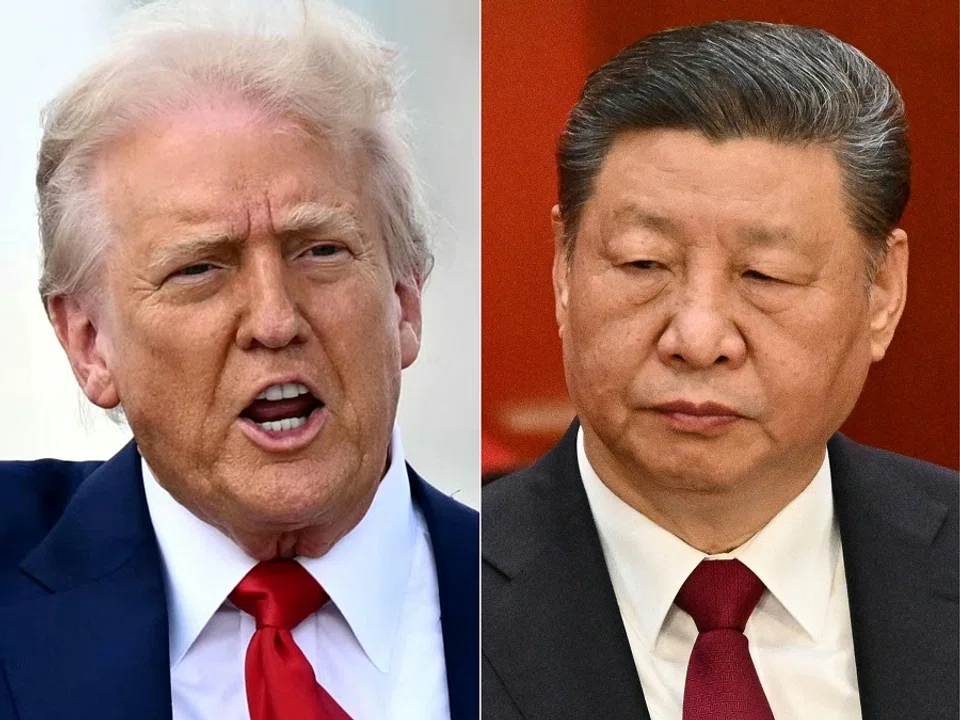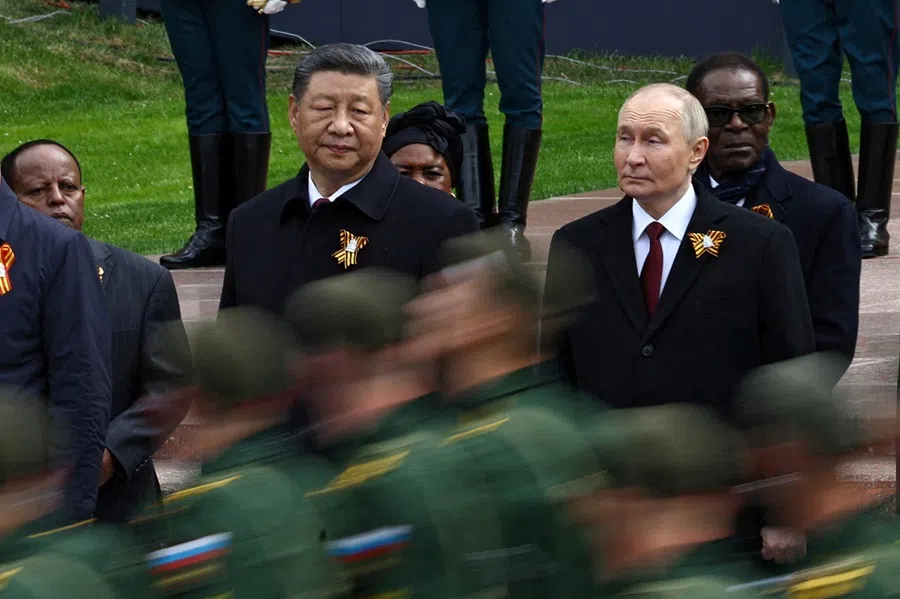Victory Day parade: Will Trump join Xi in Beijing?
As China prepares for a big military parade on 3 September to commemorate its victory in the Second Sino-Japanese War, there is much speculation on whether US President Donald Trump will turn up, and what it might mean for relations with China and other countries, particularly Japan. Lianhe Zaobao China news editor Yang Danxu gives her take.

China is set to hold a grand military parade in Beijing on 3 September to commemorate the 80th anniversary of its victory in the Second Sino-Japanese War. Japan’s Kyodo News recently dropped a bombshell, claiming that Beijing intends to invite US President Donald Trump to attend what is perceived as a “flexing” of China’s military might.
As Russian President Vladimir Putin has already confirmed his attendance, the report by Kyodo News revealed Japan’s concerns: if the leaders of China, the US and Russia were to jointly celebrate the victory, it would pose diplomatic challenges for Japan.
Will Trump be invited?
When the news came out, opinions were split into two camps. One camp believes that since China and the US were allies during World War II, there is nothing wrong with commemorating this chapter in history together; moreover, given Trump’s unconventional diplomatic style, it is not impossible that he might attend if Beijing were to extend an invitation.
The other camp finds this idea entirely absurd, as the US and China are no longer aligned. The image of Trump standing alongside Chinese and Russian leaders on Tiananmen Gate — watching Beijing showcase its military capabilities in strategic opposition to Washington — would be unimaginable.
Since his return to the White House, Trump has repeatedly expressed his desire to meet with Xi Jinping and has publicly stated his willingness to fly to Beijing to meet the Chinese leader.
The discussion on whether to invite Trump to the parade began surfacing in Chinese public discourse last week. Chinese international relations scholar Jin Canrong believed the parade is “an excellent opportunity” for China and the US to recount the history of fighting alongside each other from 1941 to 1945, reminding both countries of their “history of good cooperation, and to avoid moving towards conflict”. Victor Gao, a Chinese scholar who was formerly an English interpreter for late Chinese leader Deng Xiaoping, also wrote, “If President Trump were to attend the parade in China, I think it would be a good thing for him personally as well as for China-US relations.”

When asked about the news of China inviting Trump to the parade, Chinese foreign ministry spokesperson Mao Ning said at a regular press conference on 30 June: “I have no information to share at the moment.” By neither confirming nor denying, all possibilities remain open.
Opening doors
Since his return to the White House, Trump has repeatedly expressed his desire to meet with Xi Jinping and has publicly stated his willingness to fly to Beijing to meet the Chinese leader. During a phone call between the Chinese and US presidents in early June, both sides extended invitations to each other to visit. Could the Beijing parade be an opportunity?
For Beijing, the parade is not just a chance to showcase domestically-produced advanced weaponry, it is also an important diplomatic occasion. If Trump were to make an appearance, it would be akin to endorsing Beijing on a historic stage...
The first question to address is whether China would indeed extend an invitation to Trump. Before taking office, Trump took the unprecedented step of sending an invitation to Xi, inviting the Chinese leader to his inauguration. Though China eventually sent Vice-President Han Zheng to attend the ceremony, it was nevertheless a warm gesture to Beijing extended personally by Trump. If China does invite him to attend the parade, it is not inconceivable in terms of diplomatic courtesy.
For Beijing, the parade is not just a chance to showcase domestically-produced advanced weaponry, it is also an important diplomatic occasion. If Trump were to make an appearance, it would be akin to endorsing Beijing on a historic stage, recognising China’s historical status as a major battlefield in the East Asia theatre during WWII as well as its contribution to the anti-fascist war. At the same time, it would also help alleviate the sharp tensions between China and the US over tariffs and technology among other issues, signalling rational China-US competition and a willingness to safeguard peace despite differences.
However, if Trump were to visit China again after nearly eight years, and review the troops from atop Tiananmen Square, it could overshadow the main event. His unconventional style is also an element of unpredictability that Beijing needs to consider. The parade is one of China’s most important domestic and diplomatic events this year, leaving no room for mishaps or awkward moments.

For Trump, a visit to China is highly appealing. If it happens, the US might secure concessions from China on issues like rare earth exports and the purchase of American goods — things that would likely interest Trump, the self-proclaimed master of “winning”. In a recent Fox News interview, he also expressed goodwill towards China, claiming to be “getting along well” with Beijing.
If Trump visits China during the military parade, all eyes would be on the Chinese, American and Russian leaders appearing together.
Optics and objections
If Trump visits China during the military parade, all eyes would be on the Chinese, American and Russian leaders appearing together. Since the outbreak of the Russia-Ukraine war, Moscow’s ties with the West have deteriorated, and Putin has largely been absent from Western-led multilateral summits, with virtually no opportunities for meetings between US and Russian leaders.
Whether for Trump, who is eager to push for a ceasefire in Ukraine; for Moscow, which wants to extricate itself from war; or for Beijing, which hopes to play the role of peace broker in a multipolar world; a China-US-Russia summit and a joint statement of principles on the Ukraine war would be in the interests of all sides.
However, Trump would also face obstacles if he indeed intends to visit. First, both the US-Russia standoff over Ukraine and the China-US disputes over tariffs remain unresolved, and negotiating and aligning positions for a leaders’ summit within two months would be a major challenge.

Second, Trump sharing the stage with the leaders of two authoritarian states — in the eyes of the West — would trigger strong domestic backlash. Criticism would not come just from the Democrats, but also from the China hawks within the Republican Party. Going against the bipartisan consensus on containing China could come at a political cost for Trump.
Moreover, such a scene would be a major shock to US allies. Japan, America’s ally in East Asia, is already highly sensitive to China’s high-profile commemoration of the end of the Second Sino-Japanese War; if Trump were to appear at such an event, Tokyo would be highly alert.
Moreover, such a scene would be a major shock to US allies. Japan, America’s ally in East Asia, is already highly sensitive to China’s high-profile commemoration of the end of the Second Sino-Japanese War; if Trump were to appear at such an event, Tokyo would be highly alert. At the same time, Europe, mired in the Russia-Ukraine war, might also question the US’s strategic commitment to the continent.
Some believe that to avoid any perception of a China-US-Russia military alignment or values-based coalition, a possible arrangement would be for Trump to visit China ahead of time to meet with the Chinese and Russian leaders, but skip the military parade.
Whether or not the Japanese media reports are baseless, they have sparked new imaginings about potential China-US-Russia dynamics under the current global landscape. In such a volatile environment, given this extremely rebellious and spontaneous US president, even the most far-fetched scenarios cannot be easily dismissed.
This article was first published in Lianhe Zaobao as “特朗普会不会成为九三阅兵座上宾?”.





![[Big read] When the Arctic opens, what happens to Singapore?](https://cassette.sphdigital.com.sg/image/thinkchina/da65edebca34645c711c55e83e9877109b3c53847ebb1305573974651df1d13a)